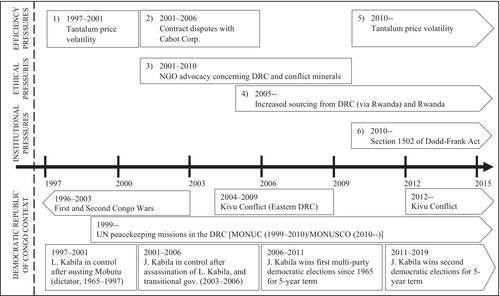Responsibility boundaries and the governance of global value chains: The interplay of efficiency, ethical, and institutional pressures in global strategy
Abstract
Research Summary
I explore the relationship of firm global strategy and global value chain (GVC) governance, within a context of expanding responsibility boundaries for unethical practices in the value chain. Specifically, focusing on the tantalum supply chain within the digital electronics GVC, I conduct a case-based process study that contextualizes the different strategic responses of three manufacturers of tantalum capacitors when faced with similar efficiency, ethical, and institutional pressures. Integrating the GVC and global strategy literatures, I find that structural inertia in GVCs limits the efficacy of strategies that preserve, rather than alter, the governance structure, instead requiring a strategic restructuring carried out by individual firms, whose internalization of responsibility boundaries is encouraged by the institutionalization of these boundaries through public policy.
Managerial Summary
Unethical practices within global value chains are increasingly becoming the responsibility of firms with no direct control over such practices, leading to growing pressures for firms to alter their global strategies to meet social and institutional demands. Research has focused on strategies that preserve the structure of the value chain, despite questions about the efficacy of these approaches. By looking at the case of “conflict minerals” within the digital electronics value chain, this study finds that inherent flaws in value chain structures, which managers can identify, require individual firms to implement strategies that change the structure of the value chain, specifically by increasing ownership and control over the linkages where unethical practices occur and encouraging public policies that add value to these strategies.



 求助内容:
求助内容: 应助结果提醒方式:
应助结果提醒方式:


